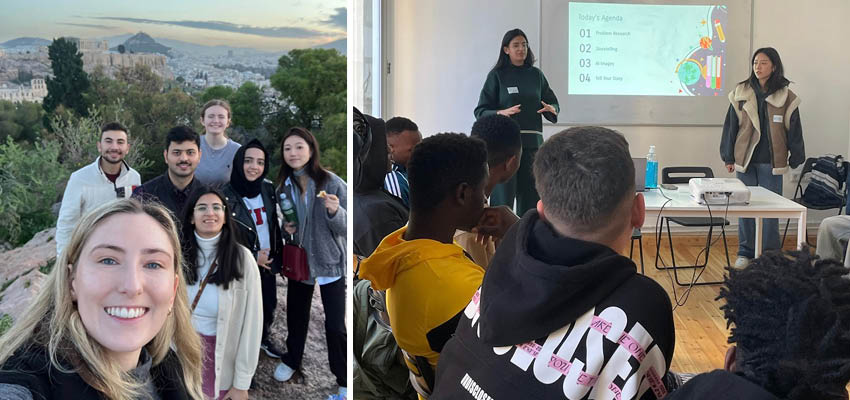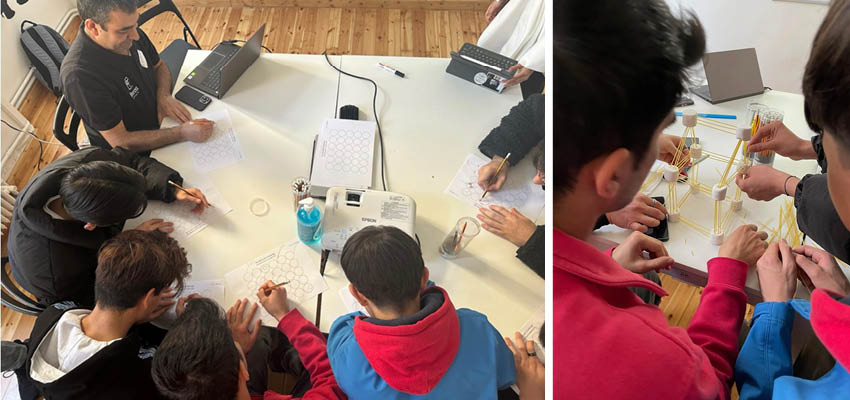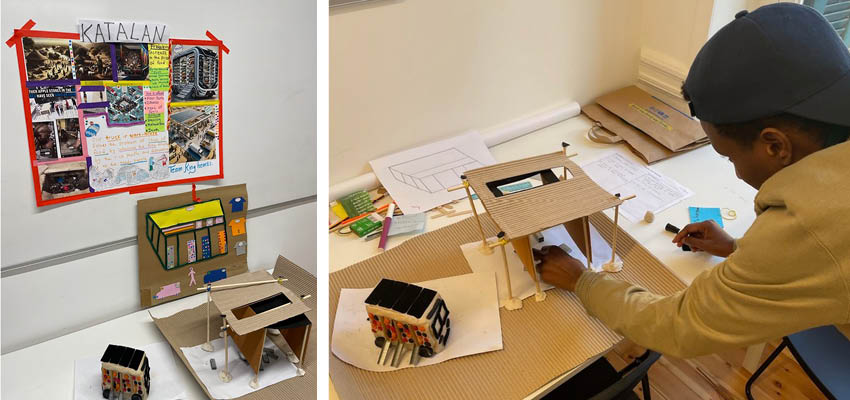
In the heart of Athens, amidst a backdrop of ancient ruins and modern struggles, a unique gathering took place. We had the privilege of traveling to Greece during the Independent Activities Period (IAP) with D-Lab alum and trip leader Caroline Morris and students from the fall D-Lab: Development class – Jad Abou Ali, Adan Abu Naaj, Ellie Han, Manal Zia, Chole Smith and Naman Sharma.
Our mission? To conduct a design workshop for refugee youth at Faros, an NGO that provides "protection services with informal education and mentoring that enable unaccompanied children to cultivate their talents," and is a longtime D-Lab community partner.
The streets of Athens bear witness to the struggles of about 3,800 unaccompanied refugee minors, a fraction of the 60,000 refugees stranded in Greece due to geopolitical shifts. Our workshop was a small gesture in the broader context, yet it held immense significance for both us and the 20 students who attended. These unaccompanied youth from Afghanistan, Palestine, Egypt, Somalia, and Sierra Leone brought with them not just their past but an eagerness to embrace new knowledge.
Our lectures, conducted in English, Arabic, and Farsi, revolved around the theme of “Problem Solving and Storytelling through Artificial Intelligence (AI)”. The students were grouped by themes such as Animals, Electricity, Food and Water, Health, and Environment, and tackled real-life issues ranging from the rising price of food to unsafe electricity and improper waste management.
The workshop
The workshop stretched over five days. Our approach was systematic yet adaptive:
Day 1/Problem Identification: This initial stage was all about uncovering and understanding the challenges faced by the students in their everyday lives. We encouraged them to delve deep into their experiences, drawing out issues that resonated on a personal level. This process was not just about listing problems; it was an exercise in empathy and self-expression.
Day 2/Research of Problems Using AI: The second phase introduced the students to the world of Artificial Intelligence, harnessing its power to research and analyze the problems they had identified. This wasn’t just a technical exercise; it was about showing these young minds how technology could be a tool for change.
Day 3/ Finding Solutions: Here, the workshop transformed into a creative laboratory. The students, equipped with knowledge and insights gained from AI research, began brainstorming solutions. This phase was particularly exhilarating, as ideas bounced off the walls of the classroom, each suggestion more innovative than the last.
Day 4/ Prototyping Solutions: The fourth phase was where ideas took physical form. The students, divided into groups, began building prototypes of their solutions. This hands-on phase was critical, as it transformed abstract concepts into tangible realities. It was inspiring to witness how the problems they identified were addressed through models and early-stage products, each a reflection of the student’s understanding and creativity.
Day 5/ Final Student Presentations: The culmination of the workshop was the final presentations. This stage was more than just a display of their work; it was a celebration of their journey from identifying a problem to creating a solution. Each group presented their findings and prototypes, explaining the rationale behind their ideas and the potential impact on their communities.
The student projects
Their solutions were as innovative as they were insightful. A food distribution truck to reallocate resources from the affluent to the needy, an electric box for safer power supply, interactive signage for better waste disposal, and a captivating safari-like experience where humans, not animals, were in enclosures. The level of empathy and creativity in these solutions left us in awe. What truly moved us was the depth of learning we experienced. It was humbling to realize that we, the so-called ‘teachers,’ learned more from these resilient young minds than we could have possibly imparted. Using AI tools like DeepAI and Dreamlike.art, we facilitated the students in producing images for ideation and creating storyboards, but the real learning came from their stories, their perspectives, and their undying spirit.

One student, the only female in the group, embodied determination and ambition. Despite facing challenges to reach the school, she showed up every day. Aspiring to design prosthetics for disabled people in her community, her dedication left us awestruck. Another bright spark was a young boy from Sierra Leone whose innovative ideas for solving hunger in his community demonstrated a level of sophistication far beyond his years.
Joy, camaraderie, and the indomitable human spirit
The workshop’s structure, blending icebreaker activities, lectures, group work, and fun, was designed to foster not just learning but also joy and camaraderie. As the days passed, we found ourselves wishing for more time with these extraordinary students. Their stories are a testament to the indomitable human spirit. Each one of them had faced more trials and tribulations than most of us could imagine. As I left Athens, I carried with me not just memories but a renewed sense of purpose. These young refugees, with their unwavering spirit and thirst for knowledge, are a powerful reminder of our shared humanity. They represent not a burden but a tremendous potential waiting to be nurtured and embraced.

The power of storytelling to enrich and empower
The world needs more initiatives that understand and address the plight of refugees, not just as a crisis to be managed but as lives to be enriched and empowered, and this is where educational approaches, like the integration of storytelling at Faros, become crucial. A key part of this vision involves the hope that the Faros school will integrate elements from our workshop, particularly the power of storytelling, into their ongoing curriculum. Storytelling, as we experienced, is not merely a method of communication; it’s a powerful educational tool that can deeply engage students, making learning more relatable and impactful. This approach can make subjects more accessible and interesting, especially for students who have experienced significant upheaval in their lives.
In the end, this workshop was more than just about design and problem-solving. It was about connecting with fellow human beings in their most vulnerable state, recognizing their potential, and being part of their journey toward a brighter future.
It was about designing dreams, one idea at a time.
About the authors
- Manal Zia is a first year master's student studying urban planning at the MIT Department of Urban Studies and Planning.
- Adan Abu Naaj is an MIT sophomore studying Computer Science.
- Jad Abou Ali is an MIT sophomore studying Chemical Engineering.
- Ellie Han is an MIT senior studying Urban Planning.
- Naman Sharma is a second year masters student at the Harvard Graduate School of Design.
- Chloe Smith is an MIT junior studying Mechanical Engineering.
More information
MIT D-Lab class: D-Lab: Development
MIT Program: Humanitarian Innovation
Contact
Libby Hsu, MIT D-Lab Associate Director of Academics

